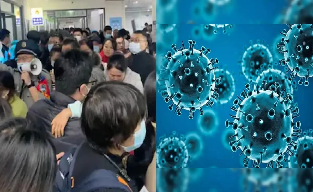As health experts continue to monitor various respiratory viruses, Human Metapneumovirus (HMPV) has emerged as a concern, especially in the wake of the COVID-19 pandemic. While both viruses can lead to respiratory illnesses, they have distinct characteristics that set them apart.
What is HMPV?
HMPV is a common virus that primarily affects the respiratory system. It spreads through droplets when an infected person coughs or sneezes and can also be transmitted by touching contaminated surfaces. HMPV typically causes symptoms like cough, runny nose, fever, sore throat, and wheezing. Severe cases can lead to bronchitis or pneumonia, particularly in vulnerable populations such as young children and the elderly.
Symptoms Comparison
Both COVID-19 and HMPV share similar symptoms, which can make it challenging to distinguish between the two without testing. Common symptoms include:
- 1. Cough
- 2. Fever
- 3. Congestion
- 4. Sore throat
- 5. Shortness of breath
However, COVID-19 may also present with additional symptoms such as loss of taste or smell, which are not typically associated with HMPV.
Impact on Health
HMPV usually peaks during winter and spring seasons, while COVID-19 can spread throughout the year due to its various evolving variants. Studies have shown that after COVID-19 restrictions were lifted, cases of HMPV surged in some regions as people were re-exposed to the virus after a period of limited contact. This increase was partly due to weakened immunity from reduced exposure during lockdowns.
Treatment Options
Currently, there is no specific antiviral treatment or vaccine for HMPV. Management focuses on relieving symptoms:
- 1. Stay hydrated and rest
- 2. Use over-the-counter medications for pain and fever
- 3. Severe cases may require hospitalization for oxygen therapy or intravenous fluids
In contrast, COVID-19 has several vaccines available and specific antiviral treatments that can help reduce the severity of the illness.
While both HMPV and COVID-19 are significant respiratory viruses, understanding their differences is crucial for effective management and treatment. As healthcare providers continue to deal with these viruses, public awareness about their symptoms and impacts will help ensure better health outcomes for affected individuals. If you experience severe symptoms or have underlying health conditions, it is essential to seek medical attention promptly.



